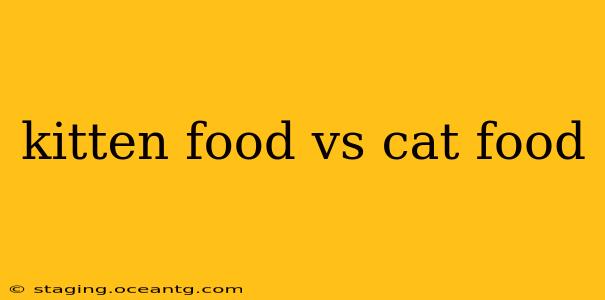Choosing the right food for your feline friend is crucial for their health and development. But when it comes to kittens versus adult cats, the nutritional needs differ significantly. Understanding the key distinctions between kitten food and cat food is paramount for ensuring your little one thrives. This guide delves into the critical differences and helps you make an informed decision.
What Makes Kitten Food Different?
Kitten food is specifically formulated to meet the higher energy and nutritional demands of rapidly growing kittens. Unlike adult cat food, it contains:
- Higher calorie density: Kittens burn more calories due to their constant play and rapid growth. Kitten food provides the extra energy needed to support this.
- Increased protein levels: Protein is essential for muscle development and overall growth. Kitten food boasts higher protein levels than adult cat food to facilitate this crucial process.
- More fat: Fat is another vital source of energy for kittens, supporting their energetic lifestyles and healthy brain development.
- Essential nutrients: Kittens require higher concentrations of specific vitamins and minerals, including taurine, arachidonic acid, and vitamin A, all vital for immune system development, vision, and overall well-being.
- Calcium and Phosphorus: These minerals are crucial for healthy bone and teeth development in growing kittens. The ratio of calcium to phosphorus is carefully balanced in kitten food to optimize absorption.
Why Can't Kittens Eat Adult Cat Food?
Feeding kittens adult cat food can lead to several health problems:
- Slowed growth: The lower calorie, protein, and fat content in adult cat food won't provide enough energy for their rapid growth, potentially resulting in stunted development.
- Nutritional deficiencies: Adult cat food lacks the vital nutrients kittens need in higher concentrations, increasing their risk of health issues.
- Weak immune system: Insufficient nutrients can weaken the kitten's immune system, making them more susceptible to illnesses.
- Bone and joint problems: Inadequate calcium and phosphorus can lead to weak bones and joints, potentially causing lifelong problems.
How Long Should a Kitten Eat Kitten Food?
Generally, kittens should eat kitten food until they reach approximately one year of age. After that, they can transition to adult cat food. However, some large or late-maturing breeds may benefit from kitten food for a slightly longer period. Always consult your veterinarian to determine the best feeding schedule for your individual kitten.
What About Switching from Kitten Food to Adult Cat Food?
Transitioning your kitten to adult cat food should be a gradual process. A sudden switch can upset their digestive system. Mix increasing amounts of adult cat food with their kitten food over a week or two to allow their bodies to adjust smoothly.
What are the Common Ingredients in Kitten Food?
Kitten food often lists high-quality protein sources such as chicken, turkey, fish, or lamb as the primary ingredients. You'll also find healthy fats like chicken fat or fish oil, alongside essential vitamins and minerals. Always check the ingredient list for added sugars, artificial flavors, or fillers, and opt for food with clearly identified and natural sources.
Are there specific kitten food types for different breeds or needs?
Yes, just like adult cat food, there are kitten foods formulated for specific breeds or health needs. For example, you might find kitten food designed for sensitive stomachs, or for kittens with specific breed predispositions to certain health conditions. Consult your veterinarian for recommendations tailored to your kitten's breed and health status.
Can I feed my kitten homemade food?
While homemade diets can be formulated for kittens, it's crucial to consult with a veterinary nutritionist to ensure it meets all their nutritional requirements. Improperly balanced homemade diets can lead to serious health consequences. It's generally safer and more convenient to opt for commercially available kitten food formulated by veterinary nutritionists.
By understanding the crucial differences between kitten food and adult cat food, and by following the guidelines outlined above, you can ensure your kitten receives the optimal nutrition they need to grow into a healthy and happy adult cat. Remember, always consult your veterinarian for personalized advice and guidance on your kitten's dietary needs.
